By: Rabia Abrar
On October 25, we held a launch event for the Happy Planet Index 2021, the 5th edition of an index that ranks countries based on how efficiently they use our limited ecological resources to live long, happy lives.
What is the Happy Planet Index?
Nic Marks kicked things off by explaining why the Happy Planet Index (HPI) was created: to address the tension with sustainability around good lives now and good lives in the future.
We all want good lives. The way we create them today, though, often comes at the expense of the planet.
The HPI gives us an idea of whether or not a country’s wellbeing is ‘sustainable’, by looking at how much of the fundamental ‘input’ – ecological footprint (the pressure we put on the planet) – is used to create the ultimate ‘output’ we’re looking for – long, happy lives.
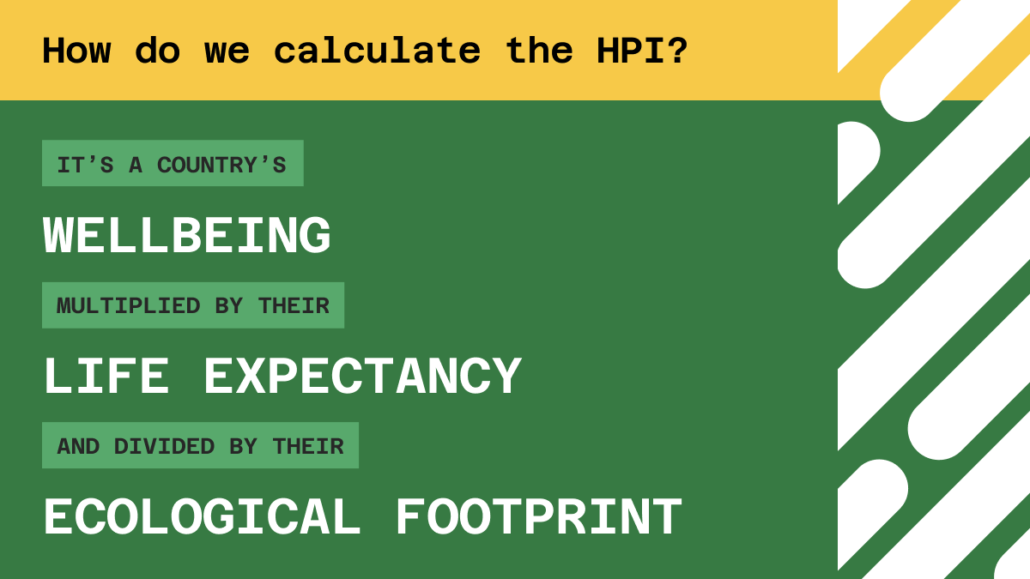
The key takeaway: We can still have good lives – we just need to create them more ‘efficiently’.
The Happy Planet Index is by no means a ‘complete’ or ‘perfect’ metric – it simply aims to act as a compass that points towards a new vision of progress for the economy.
Letting the data speak
Saamah Abdallah walked us through the sometimes surprising data insights from the Happy Planet Index, using the maps, rankings, comparison feature, and trend charts over 15 years on the interactive website.
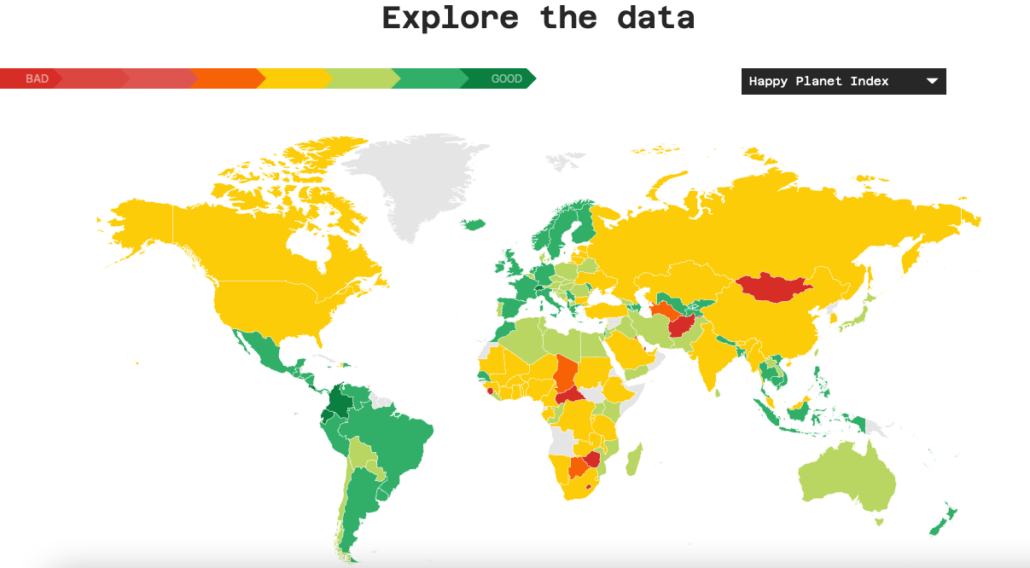
Life expectancy (from the UN):
A good score is 75+ years. As you might expect, wealthy countries have the highest life expectancies – but there are some surprises.
- Chile and Costa Rica have life expectancy rates over 80 years – and Lebanon’s 79 year life expectancy is higher than the USA.
- Other countries with 75+ years have much lower GDPs – Ecuador, Algeria, and Vietnam.
Subjective wellbeing (from the Gallup World Poll):
- The top scorer was Finland, with a score of 7.8/10.
- The high life expectancy in East Asia doesn’t translate into high wellbeing.
- Subjective wellbeing doesn’t correlate with GDP. Costa Rica and Vanuatu both have a score of 7/10 – higher than the USA – even with considerably lower GDPs than the USA.
- India has the 4th lowest subjective wellbeing score in the world in 2019.
Ecological footprint (from the Global Footprint Network):
When looking at the same world map for ecological footprint – the outcomes flipped. On the whole, countries in the ‘green’ turned ‘red’ and vice versa, showing a tension between wellbeing and life expectancy and ecological footprint.
- Africa and South Asia, with lower rates of wellbeing, have ecological footprints within the Earth’s biocapacity
- 3 countries that stayed ‘green’ were Ecuador, Armenia, and Sri Lanka – each had high life expectancy with low (sustainable) ecological footprints
- Only 27% of countries have a per capita footprint that is lower than earth’s biocapacity.
Putting it all together: the Happy Planet Index score
If you’re used to looking at more traditional measures of development – the HPI results will be surprising.
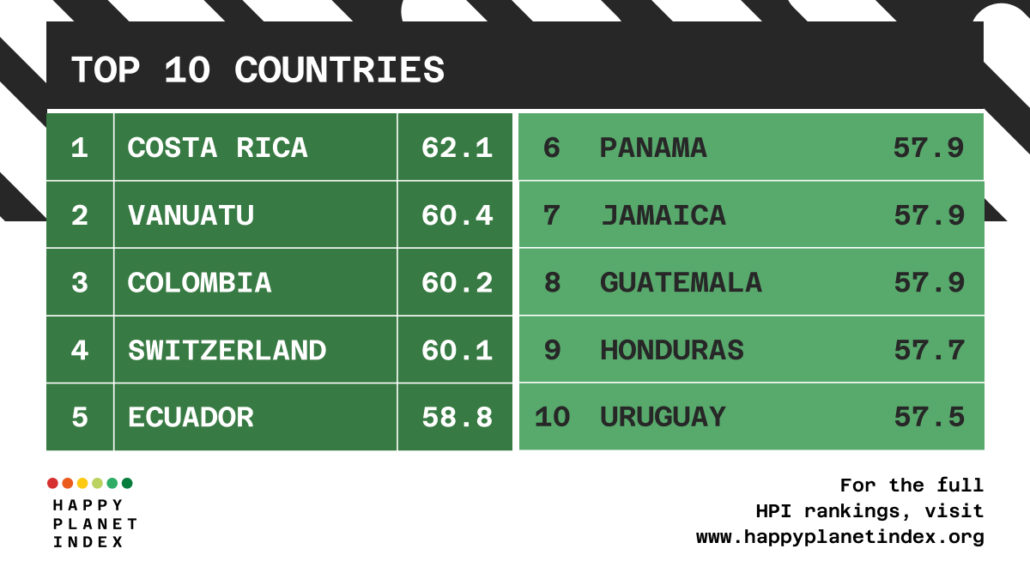
- Latin America is mostly in the green – the best performing world region on the HPI – outperforming wealthier countries like in North America.
- A lot of European countries also came up green – mainly due to declines in ecological footprint – with Switzerland rising to the top 5!
- While its ecological footprint has declined, the USA is still performing ‘inefficiently’ at 122nd place. It still uses over 5 planets worth of resources.
Key trends over time: pre & post pandemic
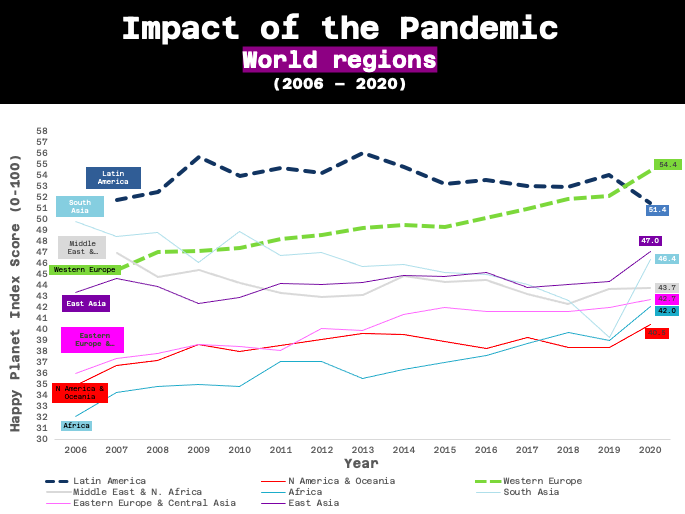
- Some world regions saw HPI scores rise – Western Europe, due to declining ecological footprints and Africa due to rapidly rising life expectancy without the same kind of rise in ecological footprint.
- The index increased by 3 points in 2019 since 2016 – meaning that we are becoming more efficient at delivering longer, happier lives with fewer environmental resources
- While much of the data from 2020 was estimated, it still provided interesting lessons from the pandemic: ecological footprint has dropped by 6.5% globally – and 15% in wealthier countries. Meanwhile, wellbeing didn’t fall in all countries – and actually rose in some (per data from the Gallup World Poll, Eurobarometer, and national statistics agencies, like in Italy).
This is a potentially positive story: It is possible to reduce our ecological footprints while maintaining a good quality of life.
Overall, what is the Happy Planet Index telling us?
Countries like Costa Rica show its possible to have high life expectancy and wellbeing with much lower ecological footprints than wealthier countries. In other words:
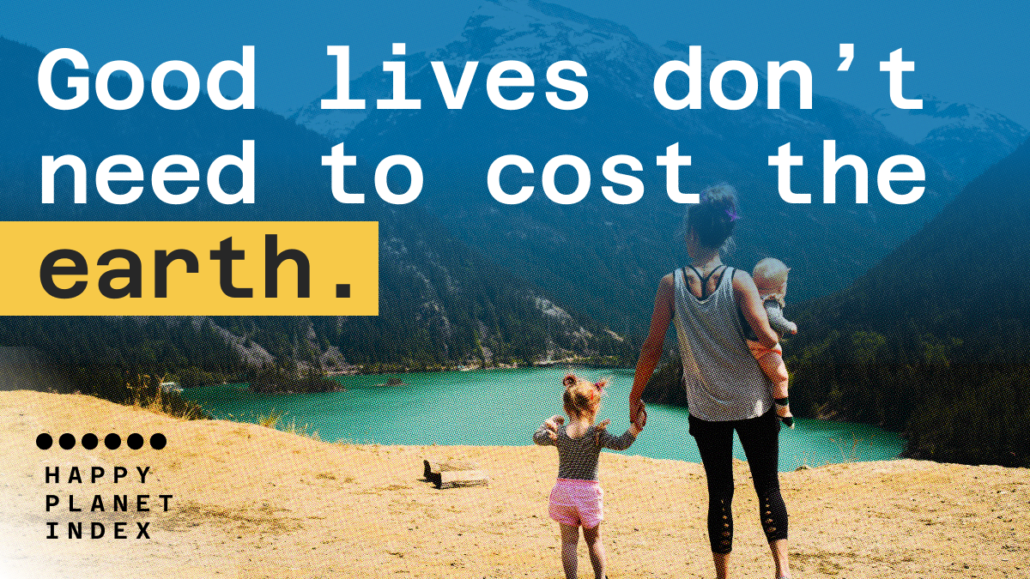
But, no country delivers high levels of happy life years with a low ecological footprint yet.
While we’ve made some progress – we’re not getting there fast enough to address challenges like the climate and biodiversity crises.
That needs to change.
Our panel on making the Happy Planet Index practical and actionable
Next, we jumped into our panel discussion, which kicked off a flurry of comments and questions in the chat.
The panelists discussed the key challenge for metrics like the Happy Planet Index:
“How do we go beyond it being a metric to compare and to see how we’re doing, to being a framework that is used to determine what policies that governments and others take forward.”
Sophie
I can’t take credit for this – but someone told me that this was the best panel discussion they’ve attended this entire year. Thanks Liz, Lorenzo, Sophie, and Tim for inspiring hope and challenging our thinking!
Key highlights from the panel discussion and Q&A session:
How is the HPI helpful for creating a new vision for an economy and for helping us work towards it?
Values are guiding principles in how we make decisions in life. Standard measures of progress like the Dow Jones, GDP, etc value financial success, economic growth, making as much money as possible. The values that drive those measures and are reinforced when those measures go up.
The real promise of HPI and other sorts of measures like it is to reorient citizens, politicians, and organisations, towards a different set of values than those which have been traditionally by purely economic indicators.
How do we make this a reality?
Indicators like HPI have to be taken as seriously as our current indicators are. Imagine a world in which you hear in the news and from political leaders at all levels and from friends – just as much info about how wellbeing in nation is doing right now, or how many bird species have gone extinct as we hear about stock indicators, gdp, etc.
With more exposure of indicators telling us how well we’re doing on delivering these intrinsic values, people will start to think they are important and put pressure on their politicians to make institutional policy decisions to maximise those values – just like right now, they are putting pressure on politicians to maximise other economic outcomes.
Some of this is happening at city, state, and regional levels – but we need to ramp this up to really have success. This is what needs to happen with an indicator like the HPI.
Tim
How is Wales leading the way to a Wellbeing Economy?
Wales is the only country in the world that has legislated to protect the interests of future generations through the Wellbeing of Future Generations Act, which focuses on achieving seven national wellbeing goals. This legislation has been driving a different approach to decision making. In developing Wales’ new ‘Beyond Recycling’ strategy, the government made the connections between zero waste and community wellbeing and tackling loneliness and isolation. What has zero waste got to do with that?
To achieve multiple of the seven national wellbeing goals – ecological resilience, inequality, community cohesion, etc – the Zero Waste initiative is doing things like establishing community libraries, library of things, repair cafes – which bring those two things together. It’s bringing people together to reduce waste and also build relationships in their communities.
I’m proud of the Welsh government’s economic strategy — which doesn’t mention GDP. What it does say – right up front – is that improving the wellbeing of everyone in Wales is the government’s economic mission.
Sophie
Why are decision-makers not already making this shift to prioritising the wellbeing of people and planet? How can we address these barriers to change and get political traction?
One of the reasons is that the status quo is much easier. We live in a world where there is a huge amount invested in the current economic world working. So, anyone trying to push against that is pushing against a big machine.
In terms of that shift – we are really reliant on courageous pioneers – but there aren’t enough of those at the national level! We can’t wait for those few national leaders … we need this to happen fast and at scale.
We need to start supporting local place based change — cities, regions, local areas that can start creating that momentum.
The big barrier is the sense that it’s not possible. But, even without endless financial resources or legislation – a lot of this is mindset, about how you’re making those decisions, what you’re prioritising, what compass you’re using.
Local places can start doing that tomorrow: they can start saying, in our area – a tiny town or big city or region – we’re going to make our decisions based on this compass, not a compass that has gotten us into this unbelievable mess in the first place.
Liz
There’s no easy answer to it, but it’s a good start to do it bit by bit. For example, in Wales, one intervention was in stopping a motorway from going ahead because it couldn’t demonstrate how that was in line with our Wellbeing of Future Generations Act. This has now led to transformation in the whole approach to transportation planning.
But if we started with trying to change the whole transportation planning system, it would have been too big and difficult. You’ve got to start somewhere and start building a movement around challenging and speaking out when decisions are being taken that are not in line with delivering wellbeing and happiness.
Sophie
Who are the actors that need to be involved in shifting priorities of economic decision making, and how can they use a tool like the HPI to effect change?
At least two actors are fundamental – but are not usually engaged: business and media.
Not everyone understands the value of this immediately – and it’s our job to create the demand for new indicators. It’s not enough to publish it – we need to be active scientists – we need to tell a story – we need to make sure that an entrepreneur sees that the HPI is useful to showcase what he or she does.
It’s not enough to have one “heroic person: that tries to push this agenda — it can’t be isolated. Around that story, we need to build lots of other stories that amplify the impact.
Lorenzo
What other tools or stories does the HPI story need to work with to gain traction overall?
The HPI has to work with all the subjective wellbeing indicators – the alternative GDP movement, everything that is moving in that direction – they may not be the same thing but they are telling a very similar story.
It’s crucial to showcase all these indicators as ways of doing economics better – about living better and doing better.
We need to have a better story to sell. “Doing better” if we prioritise a wellbeing approach to decision making, is a good story. This will give us a competitive edge over the captivating and competitive story of “doing more”, which is what the current economic system is promoting.
Lorenzo
How might we apply a “restorative climate justice” lens to making this shift?
When we talk about restorative climate justice – we are looking at past, current, and future generational justice issues – huge past injustices that hugely affect lives of current generations. When we take on this new kind of legislation / way of thinking / compass, we need to really start to challenge these inequalities that came from the past and look at the future and make sure what we do is sustainable.
Liz
Can ‘wellbeing’ act as a competitive advantage?
Just like New Zealand has done such a good job at attracting rich people from other countries to live in New Zealand – that’s the kind of tool we need to give to all countries and say to them, “use this – you are going to create better jobs, people will live longer, you’ll reduce crime, and get a lot of investment from overseas, and rich people will want to come live here. Why? Because you pollute less, you live longer, you have better wellbeing outcomes than anywhere else.”
As a national policymaker, that’s what I would want to have, because I want to be better than the others, I want to compete.
That’s how you make an indicator powerful. Once it gets catchy, it gets picked up by different countries. Wellbeing Economy Governments (WEGo) countries will hopefully do this – become a reference point for the rest of the world. You get competitive and others will want to be like you. That’s the edge I want to see coming out of this discussion.
Lorenzo
What’s not to love about a sustainable wellbeing focused approach? The world is kind of moving on. Our young generations want entirely different things – they don’t want work-life balance – they want life-work balance. If we’re going to attract those quality young people to come and work in our country, then we need to recognise that. And that plays into the wellbeing and happiness agenda.
Sophie
These are all lessons that the Happy Planet Index, and other similar metrics, must apply in order to move the needle in decision making at all levels. As Lorenzo put it, “the power of an indicator is defined by the ability that it has to transform the political system where it is applied”.
Are you inspired to work with us towards creating sustainable wellbeing?
There are lots of ways to get involved:
- Explore and download the Happy Planet Index data, briefing paper and methodology paper – and take the ‘personal HPI’ test.
- Use our promotion pack to start the conversation in your network: “How can we live good lives that don’t cost the Earth?”
- Join WEAll’s global network of organisations, movements, individuals, and policymakers who are working towards a Wellbeing Economy – one designed to serve people and planet.
Together, let’s create a world we all want, where good lives don’t cost the earth.
Watch the full recording of the event here.
For those who didn’t get a chance to have their questions answered during the event, check out our Frequently Asked Questions page. We’re updating it regularly as more questions come in!
Want to get in touch? Email us at: happyplanet@weall.org
the discussion?
Let us know what
you would like
to write about!




